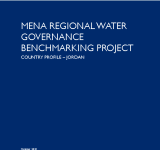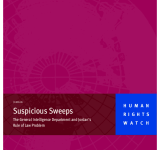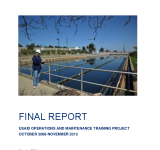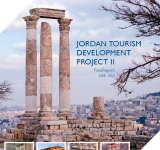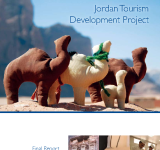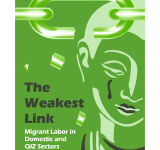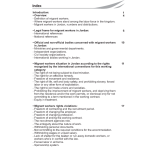legal
The report is a Jordan country profile of the Regional Water Governance Benchmarking Project (ReWaB) and the results assessment of the project. The ReWaB is a project that aims to establish a system of water governance capacity and performance benchmarking for Middle East and North Africa countries. The report resents the projects' approach to water governance benchmarking;; brief overview of the political;; economic;; and social situation in Jordan;; the country's water availability;; and it also outlines the main users and managers of Jordan's limited water resources and identifies relevant trans boundary issues. With a description of the main actors in Jordan's water governance and their influence on functional performance;; the report presents and discusses the main findings of the Policy and Legal Analysis and the expert-based assessment;; which gauged the functional effectiveness of the Jordanian water sector and application of good governance processes in water-related decision-making. The report concludes by highlighting Jordan's organizing and building capacity and strategic planning in policy documents. It also notes areas with potential challenges such as the broad function of allocating water and mechanisms for water trades and complimentary conflict mitigation.
This 66-page report documents the arbitrary arrest and abusive treatment of detainees held at the General Intelligence Department's (GID) central detention facility in Amman. The report finds that there is no clear basis in Jordanian law for the GID's law enforcement role;; and that detainees cannot seek an independent judicial review of the grounds for arrest and continued detention.
The final report is a product of the USAID/ Jordan's 55-month Operations and Maintenance Training (OMT) Program that enhances workers and organizational performance in water infrastructure. The report includes the OMT Program's executive summary;; key accomplishments and lessons learned and recommended actions;; and it also identifies some the contexts;; challenges;; methodology and results and impacts of improving the operator standards and performance. According to the report;; the OMT exceeded its expectations and achieved all results in regards to the number of certified operators;; managers;; trainers;; developers;; and coaches graduated;; certified programs;; courses and tests developed;; training sessions conducted;; and legal measures and institutional actions enacted. The report identifies hat the dedicated and hands-on support of OMT's primary partners was a key factor in achieving the OMT target results. The program also expects the structure of the Jordan program will be responsive to changing needs and the progressive development of training capacity within the Jordanian water sector. Following the OMT's completion;; the players in the Jordanian program will continue to build their capacities and move to the next state in their institutional arrangement.
The USAID Jordan Tourism Development Project is the largest dedicated tourism development project implemented by the United States Agency for International Development. The final report for the project phase of 2008-2013 shares success stories of developing Jordan's tourism sector and increasing the number of visitors to the country according to the updated national strategy for the current period with new targets and implementation of actions. The report highlights the projects' achievements in supporting archaeological conservation of key sites such as Petra;; Madaba and Amman Citadel and improving the visitor experience in Jordan through an extenstive nationwide training program. The final report also includes the stories of those who benefitted from USAID's investment in tourism and the USAID tourism project's comprehensive sustainable tourism industry development approach.
The final report is the product of the Jordan Tourism Development Project;; which is a three-year project that operated from August 2005 to August 2008. The Project worked closely with government stakeholders;; particularly the Ministry of Tourism and Antiquities and Department of Antiquities;; along with the private sector;; local communities and the tourism industry to help develop Jordan's tourism industry. As part of the project;; the USAID/Jordan's primary aim was to develop Jordan's key tourism institutions and improve the institutional environment to better facilitate tourism development. The project also worked to change perceptions of the industry through a nationwide campaign that entailed workshops;; training sessions and delivering key messages by distributing brochures;; flyers and posters. According to the report;; the work of the USAID/ Jordan Tourism Development Project has created strong momentum among the government and private sectors;; as well as communities;; for positive development of tourism in Jordan;; leaving much scope for further development of the country's tourism sector to bring Jordan closer to operating a full-fledged tourism industry that attracts increasing numbers of tourists and effectively meets their growing demands. The report also finds several areas that still need improvement such as the awareness of the importance of tourism to Jordan;; marketing and recruitment for tourism institutions and standards of tourism accommodation.
This report is the second annual report of Tamkeen Center for Legal Aid and Human Rights. It addresses the status of both migrant domestic workers and migrant workers in Qualified Industrial Zones because these two categories are subject to recurrent abuses and are the most vulnerable group due to legislative reasons;; administrative practices and the actions of their employers.
The migrant worker in Jordan situation report was issued in 2009. It presents an overview of the situation of migrant workers in Jordan and the main violations they are subject to. Additionally;; the report offers recommendations to national and international parties concerned with the migrant workers' rights.

